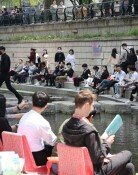[Editorial] Who Really Speaks for the Working Class?
[Editorial] Who Really Speaks for the Working Class?
Posted June. 29, 2009 09:29,
Both the ruling and opposition parties are scrambling to win the hearts and minds of the working class. The main opposition Democratic Party and the progressive Democratic Labor Party have portrayed themselves as representing low-income households, while criticizing the Lee Myung-bak administration for favoring only the rich. Apparently fed up with such criticism, President Lee and the ruling Grand National Party have begun reaching out to the underprivileged. He has visited traditional markets to see the peoples difficulties and ate a broiled dish of sliced rice cake mixed with spicy seasoning from a street vendor. President Lees well-intentioned move resulted in a brawl between the ruling and the main opposition parties. Democratic Party lawmaker Lee Seok-hyun reportedly taunted the president by saying his visit will cause the street vendor to lose its customers. Ruling party spokesman Yoon Sang-hyun snapped back by saying, Democratic Party lawmakers say they work for the working class, but what they do is stage a strike in the National Assembly while air conditioners are running.
Both the ruling and opposition parties are trying to exploit the underprivileged for their political advantage and paying no attention to their hardships. Though many have lost jobs, gone bankrupt, being harassed with debts, or suffered family breakups, none of the parties seek to find solutions to such problems. The people are sick and tired of politicians who think they can win the publics favor with lip service. They are also angry with populist politicians who fuel class conflict while failing to devote themselves to helping the working class.
The previous Roh Moo-hyun administration and the then ruling Uri Party claimed to have stood with ordinary people, the populace ended up worse than before. The former ruling camp pledged to save the bottom 80 percent of the income bracket through the sacrifices of the top 20 percent, but the wealth gap between the rich and poor widened. To appeal to 98 percent of the population at the cost of the top two percent of income earners, they imposed comprehensive property taxes on owners of big homes, but everyone knows that such a measure did nothing to revive the peoples livelihood.
If political parties genuinely care about the people, they should strive to help businesses generate jobs. To induce more investment and jobs, laws and regulations should be revised. This is what parties that serve the people must do. Given that manufacturing can no longer generate jobs, efforts are needed to raise the competitiveness of service sectors such as finance, media, information technology, education and medicine and develop new industries. Such efforts will boost the middle class and create well-paying jobs.
The Democratic Party has opposed media and financial reform bills, branding them as evil laws catering only to conglomerates. Instead of correcting the bad practices of those with vested interests in broadcast companies and labor forces, the party has collaborated with them and staged protests outside the National Assembly, fueling social instability and undermining the peoples livelihood. Many question whether the party, which itself enjoyed vested rights by having controlled the government over the past decade, is morally eligible to say it stands with the working class. The power elite of the previous governments, including former President Kim Dae-jung, have never disclosed their assets and given no explanation on how they amassed their wealth.
After his inauguration, President Lee and the ruling party sough to clean up deep-rooted irregularities of the previous left-leaning governments and create a new model for national development. His administration, however, has shown no firm principles and conviction to the people and has continued to be swayed by opposition parties and leftist civic groups. Instead of sticking to principles, it has backtracked whenever faced with opposition. Rather than fighting against those with vested interests and slanted ideologies and committing itself to political reform, the ruling camp is embroiled in factional disputes.
Caring for the peoples livelihood is necessary, but if the ruling camp keeps failing to overcome internal division and defeatism, opposition forces will gain ground and its supporters increasingly turn their back against the incumbent government and the ruling party.
When business flourishes, the livelihood of the middle and working classes will improve. If the ruling and opposition parties ignore this simple fact and discourage businesses while scrambling to win the favor of ordinary citizens, the economy and the peoples livelihood will further suffer.
In the past, education helped the poor climb the social ladder. As recently as several years ago, many children from low-income households consisting of a small room could enter a good high school and prestigious university despite getting no private education. They later became successful and helped their families.
Over the past decade, however, the country was controlled by forces who emphasized egalitarian education and democracy in education. Upward mobility through education then became impossible for the working class. Under the standardized education policy, the quality of public education significantly deteriorated and reached a point where students could never be competitive without private education. All of this made it impossible for students from low-income households and rural communities to succeed through education.
In this regard, political and education circles that have stood in the way of improving the peoples livelihood despite pledges to help them need to reflect on themselves. For their part, the government and political parties must end fraudulent politics immediately.







